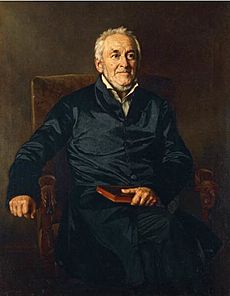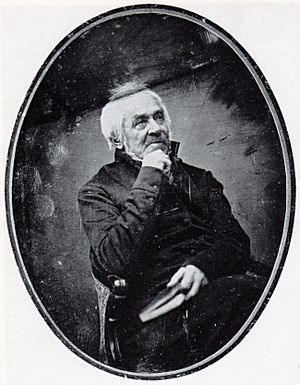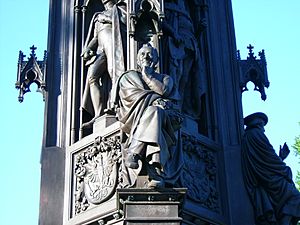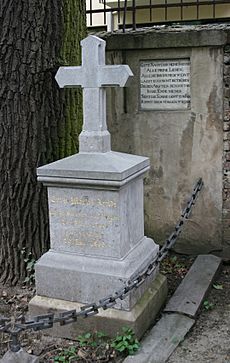Ernst Moritz Arndt facts for kids
Quick facts for kids
Ernst Moritz Arndt
|
|
|---|---|
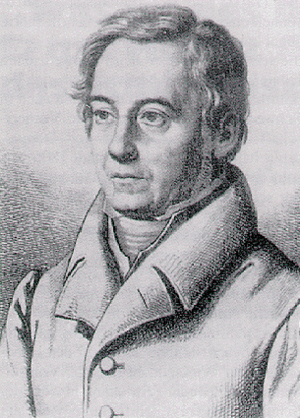 |
|
| Born | 26 December 1769 Rügen, Swedish Pomerania, Holy Roman Empire
|
| Died | 29 January 1860 (aged 90) |
| Nationality | German |
| Occupation | author, poet |
|
Notable work
|
Des Deutschen Vaterland |
| Signature | |
Ernst Moritz Arndt (born December 26, 1769 – died January 29, 1860) was a German writer, poet, and historian. He is known for his strong belief in German nationalism. Early in his life, he worked to end serfdom, which was a system where people were tied to the land and worked for a lord. Later, he fought against Napoleon's control over Germany.
Arndt had to escape to Sweden for a while because he spoke out against the French. He was one of the main people who helped create the idea of German nationalism during the wars with Napoleon. He also supported the movement to unite the many German states into one country in the 19th century. His song "Was ist des Deutschen Vaterland?" (What is the German's Fatherland?) became like an unofficial national anthem for Germany.
After his death, some of his writings that were against France were used again during both World Wars. Because of this, and some of his strong anti-Jewish and anti-Polish statements, many people today view Arndt's ideas very critically.
Contents
Early Life and Education
Ernst Moritz Arndt was born in Gross Schoritz, a small village on the island of Rügen. At that time, Rügen was part of Swedish Pomerania. His father was a successful farmer who had been freed from serfdom by the local lord, Count Putbus. His mother came from a family of well-off German farmers.
In 1787, Arndt's family moved to Stralsund, where he attended a school called an academy. After studying on his own for some time, he went to the University of Greifswald in 1791. There, he studied theology (the study of religion) and history. In 1793, he moved to the University of Jena, where he was influenced by the German philosopher Gottlieb Fichte.
After finishing his university studies, Arndt returned home. For two years, he worked as a private teacher for the family of Ludwig Koscgarten, a pastor. Arndt also trained to become a minister and helped with church services. In 1800, he began teaching history at Greifswald University.
When he was 28, Arndt decided not to become a minister. He spent 18 months traveling through countries like Austria, Hungary, Italy, France, and Belgium. As he traveled back along the Rhine river, he saw many ruined castles. This made him feel very strongly against France. He later wrote about his travels in a book called Travels in parts of Germany, Hungary, Italy and France in 1798 and 1799.
Fighting Against Serfdom and French Control
At first, Arndt supported the ideas of the French Revolution. However, he stopped supporting them when the Reign of Terror began, a time when many people were executed in France. When Napoleon started conquering parts of Europe, Arndt's dislike for France grew even stronger.
In 1800, he started teaching history at the University of Greifswald. That same year, he published a book called Über die Freiheit der alten Republiken (On the Freedom of the Old Republics). In 1803, he published Germanien und Europa, where he shared his strong opinions against French aggression.
One of his most important books was Geschichte der Leibeigenschaft in Pommern und Rügen (History of Serfdom in Pomerania and Rügen), published in 1803. This book was so powerful in showing the problems with serfdom that King Gustav IV Adolf of Sweden ended serfdom in 1806.
Arndt became a professor of history at Greifswald University in 1806. That year, he also published the first part of his book Geist der Zeit (Spirit of the Times). In this book, he openly challenged Napoleon and urged Germans to fight for their freedom from French rule. His words caused such a stir that Arndt had to flee to Sweden to escape Napoleon's anger.
In Stockholm, he found work with the government and continued to write. He used pamphlets, poems, and songs to share his passion for German independence with his fellow Germans. After the brave death of Schill in Stralsund, Arndt secretly returned to Germany in December.
In 1810, Arndt returned to Greifswald for a few months. He then continued his travels, meeting important figures like Gebhard Leberecht von Blücher, August von Gneisenau, and Heinrich Friedrich Karl Stein. In 1812, Stein asked Arndt to come to St Petersburg to help plan the final fight against France. During this time, Arndt's patriotic songs, such as Was ist des Deutschen Vaterland?, Der Gott, der Eisen wachsen ließ, and Was blasen Trompeten? became very popular.
When the University of Bonn was founded in 1818, Arndt was appointed a professor. He continued to speak out against the separate policies of the German states, which he had criticized in his Geist der Zeit. The Prussian government was unhappy with his bold calls for change. In 1819, he was arrested, and his papers were taken away.
Although he was quickly released, he was later brought before a special court in 1820. This was because of the Carlsbad Decrees, which were strict rules meant to stop liberal ideas. Arndt was not found guilty, but he was not allowed to teach as a professor, even though he still received his salary. He spent the next 20 years writing and living a quiet life.
In 1840, he was allowed to teach again, and in 1841, he became the head of the university. When the revolution of 1848 happened, Arndt, now an old man, felt his hopes and energy return. He became a representative in the National Assembly in Frankfurt. He was part of the group that offered the German emperor's crown to Frederick William IV, the King of Prussia. Arndt was very upset when the king refused the crown, so he left public life. He continued to teach and write with great energy. On his 90th birthday, he received many good wishes from all over Germany. He passed away in Bonn in January 1860 and was buried in Bonn's Old Cemetery. There are monuments to him in Schoritz, at the University of Greifswald, and in Bonn.
Arndt was married twice. His first wife died in 1801, and he married again in 1817. His youngest son passed away in 1834.
Views on Different Groups of People
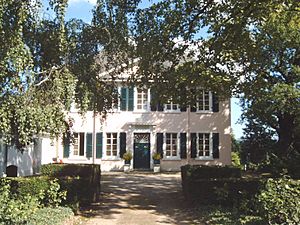
Like some other thinkers of his time, Arndt believed that the German nation should be made up of people who were all ethnically similar. He looked back at German history, especially the Middle Ages, to support this idea. His writings did not offer a clear political plan. Instead, they focused on external enemies. While he often spoke of "freedom," the freedom Arndt imagined was for a unified national community, not for a society with many different cultures. He often described the French as weak and morally corrupt, while praising what he saw as German strengths.
He wrote:
"The Germans have not been mixed with foreign peoples, have not become half-breeds, they more than many other peoples have remained in their native state of purity."
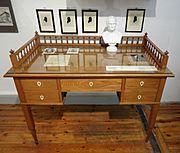
These ideas led Arndt to create writings against the French during Napoleon's control of the German states:
"When I say I hate the French carelessness, I despise the French daintiness, I disapprove of the French talkativeness and flightiness, I may be pointing out a flaw, but it is a flaw that I share with all my people. I could likewise say I hate the English arrogance, the English strictness, the English isolation. These hated, despised, criticized characteristics are not necessarily bad in themselves; from the peoples they represent, they may come with great virtues that I and my people lack. Therefore ... let us hate our Frenchmen, who have shamed and destroyed our power and innocence, even more, now that we feel how they weaken and lessen our goodness and strength."
Arndt also held negative views towards Poles and other Slavic people. In 1831, he published a pamphlet against Poles, calling their culture "barbaric and wild." During the Revolution of 1848, when there was talk of bringing back the Polish state, Arndt stated that Slavic groups "have never done or been able to do anything lasting with respect to state, science, or art." He concluded: "I state from the start, with world history that judges, that the Poles and the whole Slavonic tribe are inferior to Germans."
He also warned against close contact with Judaism. He spoke of "thousands [of Jews] who will now come upon us even more from Poland because of Russian harshness" – calling it "the impure flood from the East." He also claimed there was a Jewish intellectual conspiracy, saying that Jews had "taken over" half of literature.
Arndt combined his anti-Jewish views with his anti-French opinions. He called the French "the Jewish people" or "refined bad Jews." In 1815, he wrote about the French: "Jews... I call them again, not only for their Jewish tricks and their cheap greed, but even more because of their Jew-like sticking together."
Works
Poems and Songs
Not all of Arndt's poems were about politics. Many of his Gedichte (poems) were religious. Here are some of his most famous poems and songs:
- Sind wir vereint zur guten Stunde ("When we are united in happy times")
- Was ist des Deutschen Vaterland? ("What is the fatherland of the Germans?")
- What is the German's Fatherland? German Classics 1900 William Cleaver Wilkinson
- Vaterlandslied (Arndt), also known as Der Gott, der Eisen wachsen ließ ("The god who let iron grow"). The music was written by Albert Methfessel (1785–1869).
- Zu den Waffen, zu den Waffen ("To arms, to arms")
- Kommt her, ihr seid geladen (Come here, you are invited), EG 213 (No. 213 in the current German Protestant hymnal Evangelisches Gesangbuch)
- Ich weiß, woran ich glaube ("I know what I believe in", EG 357)
- Die Leipziger Schlacht ("The Battle of Leipzig", from a German reader for elementary schools)
Other Selected Works
- Reise durch Schweden ("Voyage through Sweden", 1797)
- Nebenstunden, Beschreibung und Geschichte der Shetländischen Inseln und Orkaden ("Description and history of the Shetland and Orkney Islands", 1820)
- Die Frage über die Niederlande ("The Netherlands question", 1831)
- Erinnerungen aus dem äusseren Leben (1840) This is his autobiography and the best source of information about Arndt's life. It was used for E. M. Seeley's Life and Adventures of E. M. Arndt (1879).
- Rhein- und Ahrwanderungen ("Travels along the Rhine and Ahr", 1846)
- Meine Wanderungen und Wandlungen mit dem Reichsfreiherrn Heinrich Carl Friedrich vom Stein ("My travels and changes with Reichsfreiherr Heinrich Carl Friedrich vom Stein", 1858)
- Pro populo germanico (1854) This book was originally meant to be the fifth part of his Geist der Zeit.
See also
 In Spanish: Ernst Moritz Arndt para niños
In Spanish: Ernst Moritz Arndt para niños
- Greifswald
- Ernst Moritz Arndt Tower
- Ernst Moritz Arndt University of Greifswald (an old German university named after him until 2018)
- List of German-language authors
 | Leon Lynch |
 | Milton P. Webster |
 | Ferdinand Smith |


